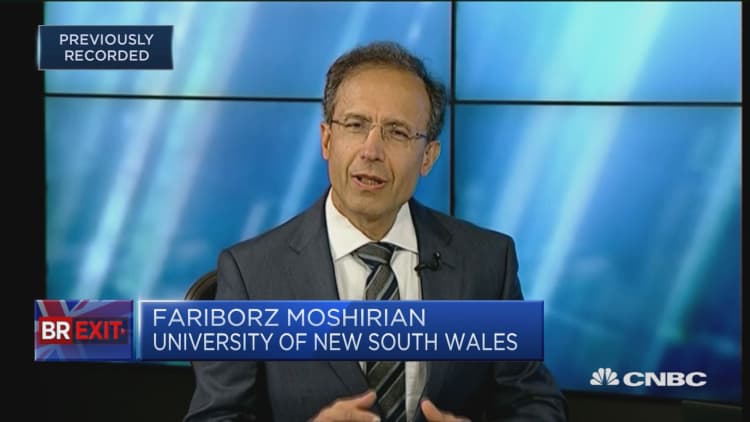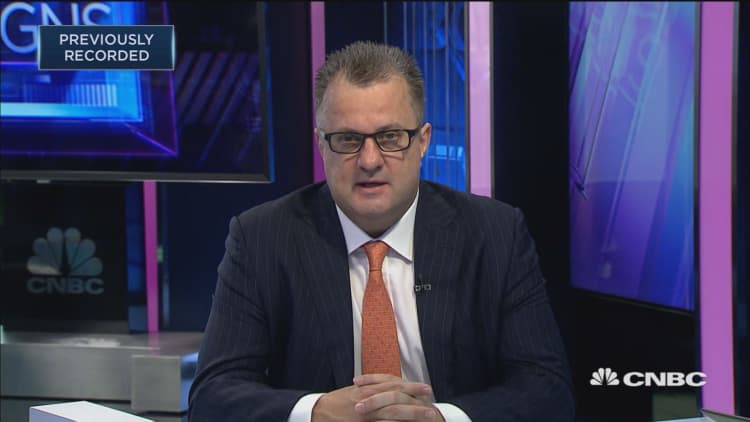Sterling fell sharply against the dollar Tuesday morning with several British media outlets reporting that Brexit talks were close to breaking down.
Sky News reported that German Chancellor Angela Merkel had told U.K. Prime Minister Boris Johnson that a deal for Brexit is now "overwhelmingly unlikely," citing a Downing Street source.
Meanwhile, the BBC said a government official said the EU had not shown a desire to "budge one centimeter" since Johnson submitted new proposals to Brussels last week. The official, who was not named, said a deal was not completely ruled out, but the BBC cited another unnamed source as saying Johnson's plans were "the only way out."
By 10:30 a.m. London time, the British pound traded 0.47% lower against the dollar at $1.2235 as the reports emerged.

The new plans
The U.K. government's new plans have received a lukewarm reception on the continent. This week was seen as the last in which both sides could try to find an agreement on a Brexit deal, ahead of the U.K.'s scheduled departure date of October 31.
The new proposals have aimed to get around the contentious Irish "backstop" arrangement — something of an insurance policy to prevent a hard border between Ireland and Northern Ireland if the EU and U.K. could not agree a post-Brexit trade deal. The U.K.'s new proposals would see Northern Ireland (a part of the U.K.) stay in the European single market for goods, but leave the customs union.
The U.K. said checks on goods going from Northern Ireland to the Republic of Ireland would undergo customs checks away from the border, taking away the need (the government said) for any physical border infrastructure on the island of Ireland. The EU is skeptical over British plans and Merkel reportedly told Johnson in a call Tuesday that Northern Ireland would have to stay in a customs union.
A spokesperson for Merkel's office declined to comment on the reports when contacted by CNBC.
The BBC's Brussels correspondent Adam Fleming later tweeted that EU officials "do not recognize Merkel's reported language as the agreed EU position." The European Commission also responded that its position had not changed, with a spokeswoman cited by Reuters as saying "we want a deal, we are working for a deal with the United Kingdom."

Cynicism
There is cynicism that the U.K. government does not want a deal to be struck with the EU. A no-deal Brexit would mean there is no transition period after the EU departure date and no post-Brexit trade relationship set up with the bloc.
Despite the turbulence a no-deal Brexit is expected to cause, having no transition period with the EU would allow the U.K. to strike trade deals around the world immediately, hence some Brexiteers see this as the favored option.
The main opposition Labour Party in the U.K. has accused the government of pursuing a no-deal Brexit from the start. Labour's Shadow Secretary of State for Brexit Kier Starmer tweeted Tuesday: "This is yet another cynical attempt by Number 10 to sabotage the negotiations."
He said that it was more important than ever that Parliament unites to prevent a no-deal Brexit. A law has been passed to prevent the government taking the U.K. out of the EU without a deal on October 31. If no deal is approved by October 19, Johnson is legally bound to ask the EU for a delay to Brexit (although the EU might not grant another extension).
There are concerns that the government will try to sabotage asking the EU for a further delay, if it is forced to, by making it clear it will not negotiate further or submit any new Brexit proposals.
The outgoing European Council President Donald Tusk also took aim at Johnson on Tuesday, accusing him of playing a blame game.


